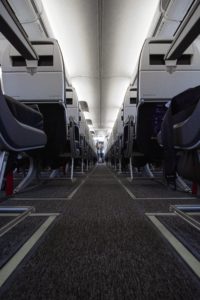Emission reduction targets and travel policies at ETH Zurich
ETH Zurich is a public research university in Switzerland, which focuses primarily on science, technology, engineering and mathematics.
Working in a participatory process since 2018 with the Executive Board, departments and administrative units, ETH Zurich has committed to a reduction of 11% of their flight emissions per capita from 2019 to 2025 compared to the average for the years 2016-2018. In 2021, some of the departments increased their reduction target so that the ETH-wide reduction target is now 15%. ETH Zurich has developed a wide range of concrete and innovative measures to achieve the reduction target.
Dropdown
Awareness raising in research and teaching
New tools were developed, such as fact sheets on flight emissions and alternatives to air travel, a flight decision tree (1) to help staff make decisions, and a map comparing train and air travel times and CO₂ emissions (2). An Excellence Award for Sustainable Travel was launched, and courses and colloquia on flight reduction or compensation were held.
Travel and expenses policy
ETH Zurich Business Expenses Policy (3) was updated in 2021, allowing only the most necessary business trips and preferring virtual alternatives. Flights are restricted to an absolute minimum. For business trip destinations that can be reached by train or bus in less than 8 hours’ travel time, those corresponding options are to be considered. The private use of frequent flyer miles earned on business trips is forbidden.
Sustainable travel planning
A routeRANK travel decision tool (4) including carbon footprint data was introduced for members of ETH Zurich. Direct flights are encouraged, as well as booking a fuel-efficient aircraft or airline. Bundling and combining travels (e.g. a conference and a project meeting) is favoured. Preference is given to train rides over flights (e.g. incentives for taking the train, disincentives for business flights). Improved videoconferencing and virtual-conference tools have been acquired and training on virtual presentation techniques provided. Efforts are ongoing to reduce the number of staff per working group per congress without jeopardising the career prospects of young scientists.
A new monitoring and evaluation system for flight emissions
From 2019 onwards, the flights of all organisational units are recorded in the ETH finance system, listing flight number, travel class and date. Departments and administrative units receive a monthly summary of their flight-related CO2 emissions. This helps motivate travellers to opt for lower-emission economy class (rather than business class flights), direct flights and airlines with more efficient fleets.
Internal CO₂ tax
Some departments have also decided to introduce their own internal CO₂ tax (Carbon Tax) as a steering tax. The revenue will be used for teaching, research or the promotion of young talent for projects focusing on CO₂ reduction.
External link
Economy class tickets only

Online meetings & trainings

Teleworking

Cover photo © Philipp Dubach/Unsplash.
